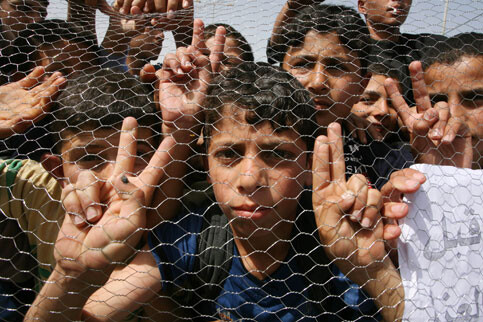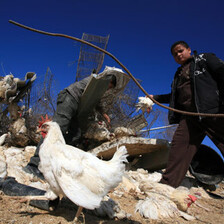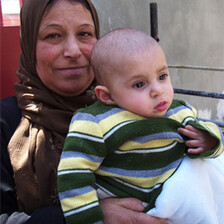Gaza Strip 4 June 2008

Palestinian children in Gaza protest Israel’s crippling siege on the Gaza Strip, April 2008. (Wissam Nassar/MaanImages)
“Can you imagine that when a child of mine asks me for one shekel [USD 0.30], I can’t afford to give it to him? That’s why I hide from my children from early in the morning until evening.”
Naser al-Batran is a 41-year-old father of five children living in the central Gaza Strip. He used to work for a weaving factory inside Israel but found himself jobless after Israel’s total closure of Gaza’s travel and commercial crossings in June 2007, worsening an already difficult economic situation since Israel began shutting out Palestinian laborers years ago.
“Life has become miserable, extremely miserable,” he said.
The crippling economic blockade of the Gaza Strip colors all aspects of life there. According to the Hamas-run Palestinian Health Ministry, 70 percent of Gaza’s 1.5 million residents suffer from anemia, including 44 percent of pregnant women.
Malnutrition among Palestinian children has also increased over the past 11 months, affecting more than 10 percent of Gaza’s children under the age of 18, according to the Gaza City-based Ard al-Insan health organization.
A recent survey conducted by Ard al-Insan revealed that around 10.4 percent of households in Gaza City and in the northern and southern Gaza Strip suffer from chronic malnutrition. Stunting and low birth weights are also affecting children there.
“The inability of the majority of Palestinian households to purchase basic food items has increased the magnitude of this health problem,” explained Dr. Adnan Abdel Aziz al-Wahadi, the head of the health care unit of Ard Al-Insan.
“In comparison with previous times, the demand for health and nutrition care has increased over the past 11 months, as evidenced, for example, by a survey conducted in 2003 indicating that only 3.4 percent of households had malnutrition during that year,” Dr. al-Wahadi explained.
A large number of households in Gaza are currently unable to afford essential food items. Israel’s siege and collective punishment on the Gaza Strip following the democratically-elected Hamas government’s takeover there a year ago has been characterized by severe restrictions on food and fuel imports.
The situation means that Palestinians in Gaza are simply unable to afford former staples. Mohammed Mohareb, a fishmonger at the Nuseirat refugee camp market in the central Gaza Strip, complained of the residents’ inability to buy fish.
“Prior to these circumstances, I would bring in 100 boxes of fish, but now I only bring in 20, and I still can’t sell all of the fish. Now, I lose much more than I earn,” he said.
Nour al-Din Abu-Saqer, a fruit vendor, standing idle behind his fruit stand in the Maghazi refugee camp market in the central Gaza Strip, lamented, “Over the past couple of months, people have become even less likely to buy fruit, bearing in mind that for the past 11 months we have been selling less fruit than we used to.”
“We only sell fruit during the first week of each month when government employees obtain their salaries. During the rest of the month, many of our goods perish as sales go down. The prices are beyond people’s purchasing power, especially for those who are unemployed,” he explained.
The World Food Program states that 80 percent of households in the Gaza Strip depend on international food aid as the unemployment rate has reached more than 80 percent.
More than 95 percent of Gaza’s industrial sector, involving textiles, canneries, weaving factories and metal workshops has already stopped working, rendering 32,000 laborers jobless.
Last month, Israel further reduced shipments of diesel, cooking gas, and food into the Gaza Strip, thus aggravating the deteriorating living conditions to the extent that many motorists were forced to use cooking oil instead of diesel to keep their vehicles running.
“We are a society with no natural resources; the only resource we have is the human one, so unless there is adequate food and health, how are we supposed to develop a nation?” wondered Dr. al-Wahadi. For the time being, it seems this question will remain unanswered.
Rami Almeghari is currently contributor to several media outlets including the Palestine Chronicle, IMEMC, The Electronic Intifada and Free Speech Radio News. Rami is also a former senior English translator at and editor in chief of the international press center of the Gaza-based Palestinian Information Service. He can be contacted at rami_almeghari at hotmail.com.
Related Links




